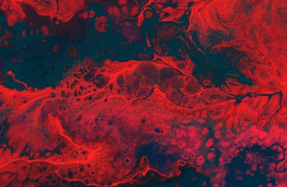Mark Bibbins and Paul Lisicky: Sooner or Later
 Left: Paul Lisicky, photo by Beowulf Sheehan. Right: Mark Bibbins, photo by Rex Lott.
Left: Paul Lisicky, photo by Beowulf Sheehan. Right: Mark Bibbins, photo by Rex Lott. Mark Bibbins and I have known each other for the better part of twenty years. We have very close friends in common. We have shown up at the same Thanksgiving dinners and readings, or in Provincetown at the same time. Last year we even flew from Portland to JFK on a redeye, post-AWP, seated side by side, which means Mark has probably heard me snore or make funny sounds in my sleep as my head rolled forward. I’ve always loved his work.
We decided to talk after realizing our new books—his brilliant 13th Balloon, an elegy-in-verse for his boyfriend Mark Crast, and my memoir Later: My Life at the Edge of the World—both look back at the early 1990s, a moment when the AIDS crisis was especially fraught, when none of the drugs worked, and so many of our friends were dying. What was it like to survive under those conditions? And what did we carry with us from those times to the present? Did we ever leave, at least psychologically? What follows is a record of a month-long conversation. A record, too, of getting to be better, deeper friends after knowing each other casually for so long.
—Paul Lisicky for Guernica
Paul Lisicky: I’ve been thinking about the fact that both of our books are coming out in 2020, close to thirty years after some of the bleakest years of the AIDS crisis, before antiretrovirals. I have my own thoughts as to why it took me so long to give shape to this experience, and I’m curious about yours. 13th Balloon does an incredible job of capturing that unnerving paradox of temporal distance and emotional proximity. Two passages that haunt me: “When I cut into the past / what leaks out is you” And: “Strange to look vainly for oneself in history / and stranger to realize / that there is a chance / one might find oneself there” Did it ever occur to you to write about the loss of Mark, and the dread and complexity of those years, at an earlier point? Why did you wait until now?
Mark Bibbins: You’re right that a lot of time passed, though I didn’t (and don’t) feel like I was waiting, which implies that I consciously chose not to write about those experiences, that I held off for some reason. So many writers—poets, novelists, essayists, playwrights, queer and otherwise—were documenting the AIDS crisis (which is a phrase I’m almost tempted to put in quotes) in real time, in beautiful and harrowing and necessary ways that I found inspiring. If that could be called a community I felt like part of it, albeit peripherally, as I was just starting out as a poet.
You’re reading a preview, subscribe to read more.
Start your free 30 days





